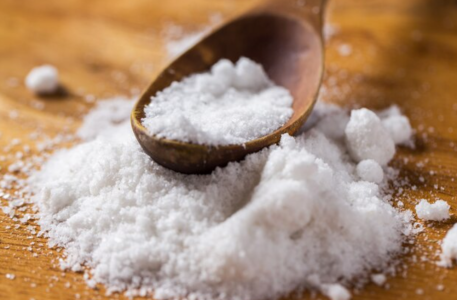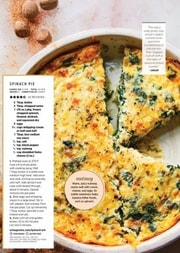Lower your blood pressure with this little-known salt substitute suggested by experts
By
- Replies 11
High blood pressure, or hypertension, is a silent killer that affects one in three Australians.
It's a condition that stealthily increases the risk of stroke and heart disease, often without any noticeable symptoms.
One of the possible causes is a high sodium intake, commonly from regular table salt. But what if there was a simple, cost-effective solution that could significantly lower blood pressure and improve health outcomes?
Enter potassium-enriched salt, a lesser-known alternative that health experts are championing.
The George Institute for Global Health conducted a large randomised trial that revealed the impressive benefits of potassium-enriched salt substitutes.
The study found that these substitutes were more effective at lowering blood pressure than any other treatment solutions, while also providing the body with essential potassium.
'If the world switched from using regular salt to potassium-enriched it would prevent millions of strokes and heart attacks every year at very low cost,' said Alta Schutte, a professor at the George Institute for Global Health.
Despite the compelling evidence, potassium-enriched salt is not widely recommended in hypertension treatment plans.
Out of 32 independent treatment plans analysed by the researchers, only the Chinese and European guidelines specifically advocated for the switch to potassium-enriched salt.
Further, various health experts from Australia, the US, Japan, South Africa, and India are working together for it to be added to treatments globally.
‘We found current clinical guidelines offer incomplete and inconsistent recommendations about the use of these salt substitutes,’ Schutte said.
‘Given the wealth of evidence available, we feel it's time to include salt substitutes in treatment guidelines to help address spiralling rates of uncontrolled high blood pressure around the world.’
Potassium-enriched salt is a blend of sodium chloride and potassium chloride, with the latter making up 25 per cent of the mix.
Potassium is a vital mineral that naturally occurs in many foods and is essential for the health of human body tissues.
Potassium deficiency has been linked to high blood pressure, making this salt substitute a two-pronged approach to managing hypertension.
The George Institute for Global Health's study found that reducing sodium intake and increasing potassium was extremely effective at lowering blood pressure.
This is a significant finding, considering that people are currently consuming an estimated 4.3g of sodium a day, more than double the World Health Organisation's recommended intake of 2000mg a day.
One of the main reasons previous attempts at salt substitution have failed is due to taste.
Many substitutes dull the flavour of food, making them less appealing to consumers.
However, the potassium-enriched substitute used in the trial was almost undetectable, removing this significant barrier.
'Unwanted taste effects are the main reason why efforts to reduce salt intake have failed for more than two decades,' Schutte said.
'The willingness of patients to keep using potassium-enriched salt removes that barrier which is why it can be a game-changer.'
‘We strongly encourage clinical guideline bodies to review their recommendations about the use of potassium-enriched salt substitutes at the earliest opportunity.’
The study's authors strongly recommend potassium-enriched salt for patients with hypertension, unless they have advanced kidney disease or other contraindications.
For the general population, the recommendation is conditional: if you must add salt to foods, opt for potassium-enriched salt, provided there is a low likelihood of undiagnosed advanced kidney disease.
‘Strong recommendation for patients with hypertension—Potassium-enriched salt with a composition of approximately 75 per cent sodium chloride and 25 per cent potassium chloride should be recommended to all patients with hypertension, unless they have advanced kidney disease, are using a potassium supplement, are using a potassium-sparing diuretic or have another contra-indication,’ they said.
‘Conditional recommendation for the general population–If you have to add salt to foods, potassium-enriched salt with a composition of approximately 75 per cent sodium chloride and 25 per cent potassium chloride can be recommended for use by the general population, in settings where there is a low likelihood that people with advanced kidney disease (stage 4-5) will be undiagnosed by the health system and contraindications to use can be printed on product packaging.’
Professor Bruce Neal, executive director at The George Institute Australia, cautioned that while the solution is beneficial, it should not be used by patients with advanced kidney disease.
'Healthcare workers know not to recommend potassium-enriched salt in the presence of kidney disease and risks for these patients can be avoided,' Neal said.
The study also highlighted the need for potassium-enriched salt to be widely available in supermarkets to remove an additional barrier to the treatment plan.

So, members, have you tried potassium-enriched salt? What has been your experience? Share your thoughts in the comments below.
It's a condition that stealthily increases the risk of stroke and heart disease, often without any noticeable symptoms.
One of the possible causes is a high sodium intake, commonly from regular table salt. But what if there was a simple, cost-effective solution that could significantly lower blood pressure and improve health outcomes?
Enter potassium-enriched salt, a lesser-known alternative that health experts are championing.
The George Institute for Global Health conducted a large randomised trial that revealed the impressive benefits of potassium-enriched salt substitutes.
The study found that these substitutes were more effective at lowering blood pressure than any other treatment solutions, while also providing the body with essential potassium.
'If the world switched from using regular salt to potassium-enriched it would prevent millions of strokes and heart attacks every year at very low cost,' said Alta Schutte, a professor at the George Institute for Global Health.
Despite the compelling evidence, potassium-enriched salt is not widely recommended in hypertension treatment plans.
Out of 32 independent treatment plans analysed by the researchers, only the Chinese and European guidelines specifically advocated for the switch to potassium-enriched salt.
Further, various health experts from Australia, the US, Japan, South Africa, and India are working together for it to be added to treatments globally.
‘We found current clinical guidelines offer incomplete and inconsistent recommendations about the use of these salt substitutes,’ Schutte said.
‘Given the wealth of evidence available, we feel it's time to include salt substitutes in treatment guidelines to help address spiralling rates of uncontrolled high blood pressure around the world.’
Potassium-enriched salt is a blend of sodium chloride and potassium chloride, with the latter making up 25 per cent of the mix.
Potassium is a vital mineral that naturally occurs in many foods and is essential for the health of human body tissues.
Potassium deficiency has been linked to high blood pressure, making this salt substitute a two-pronged approach to managing hypertension.
The George Institute for Global Health's study found that reducing sodium intake and increasing potassium was extremely effective at lowering blood pressure.
This is a significant finding, considering that people are currently consuming an estimated 4.3g of sodium a day, more than double the World Health Organisation's recommended intake of 2000mg a day.
One of the main reasons previous attempts at salt substitution have failed is due to taste.
Many substitutes dull the flavour of food, making them less appealing to consumers.
However, the potassium-enriched substitute used in the trial was almost undetectable, removing this significant barrier.
'Unwanted taste effects are the main reason why efforts to reduce salt intake have failed for more than two decades,' Schutte said.
'The willingness of patients to keep using potassium-enriched salt removes that barrier which is why it can be a game-changer.'
‘We strongly encourage clinical guideline bodies to review their recommendations about the use of potassium-enriched salt substitutes at the earliest opportunity.’
The study's authors strongly recommend potassium-enriched salt for patients with hypertension, unless they have advanced kidney disease or other contraindications.
For the general population, the recommendation is conditional: if you must add salt to foods, opt for potassium-enriched salt, provided there is a low likelihood of undiagnosed advanced kidney disease.
‘Strong recommendation for patients with hypertension—Potassium-enriched salt with a composition of approximately 75 per cent sodium chloride and 25 per cent potassium chloride should be recommended to all patients with hypertension, unless they have advanced kidney disease, are using a potassium supplement, are using a potassium-sparing diuretic or have another contra-indication,’ they said.
‘Conditional recommendation for the general population–If you have to add salt to foods, potassium-enriched salt with a composition of approximately 75 per cent sodium chloride and 25 per cent potassium chloride can be recommended for use by the general population, in settings where there is a low likelihood that people with advanced kidney disease (stage 4-5) will be undiagnosed by the health system and contraindications to use can be printed on product packaging.’
Professor Bruce Neal, executive director at The George Institute Australia, cautioned that while the solution is beneficial, it should not be used by patients with advanced kidney disease.
'Healthcare workers know not to recommend potassium-enriched salt in the presence of kidney disease and risks for these patients can be avoided,' Neal said.
The study also highlighted the need for potassium-enriched salt to be widely available in supermarkets to remove an additional barrier to the treatment plan.
Key Takeaways
- Health experts advocate for low-sodium potassium-enriched salt as a superior option for preventing high blood pressure, which is not widely used in medical regimes.
- A large trial showed that potassium-enriched salt substitutes significantly lowered blood pressure and provided necessary potassium.
- Global health guidelines currently offer limited and inconsistent advice on using these salt substitutes, despite what researchers say is strong evidence of their benefits.
- Recommendations suggest a strong endorsement for patients with hypertension to use potassium-enriched salt, with some caveats for those with advanced kidney disease or other contraindications.
So, members, have you tried potassium-enriched salt? What has been your experience? Share your thoughts in the comments below.
Last edited by a moderator:








